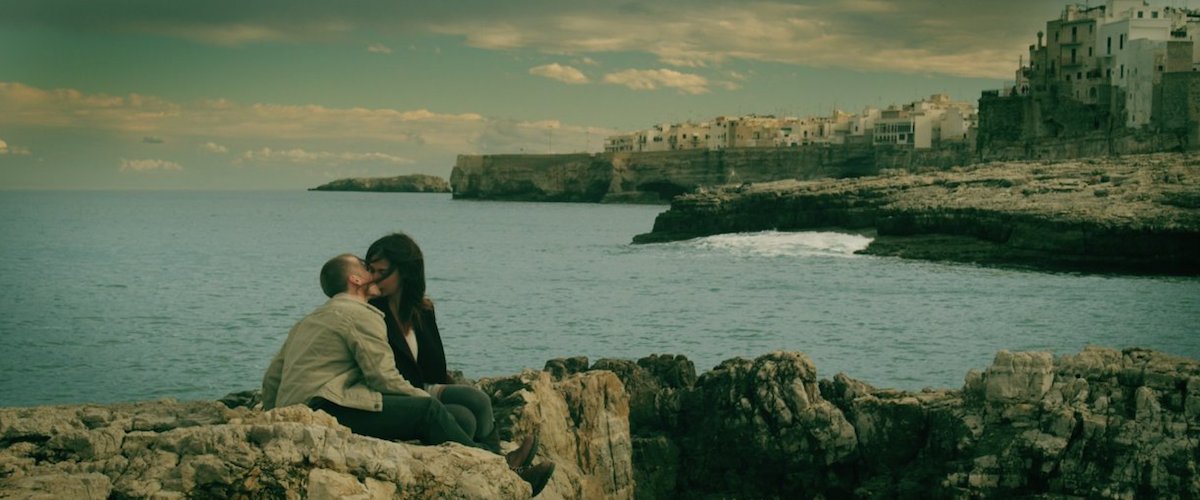
Now streaming on:
"Spring," an ambitious and often enchanting genre hybrid, is at its best when it's a straight-forward romance. Which is a shame since elements of supernatural horror eventually intrude, and become too prominent to ignore. At that point, the film sacrifices its charming sense of immediacy and warmth, and becomes far more blunt and convoluted than it needs to be. Tone is everything in "Spring," a "Before Sunset"-esque drama whose amiably rambling plot mimics its love-lorn protagonist's journey. Awkward but earnest American Evan ("Thumbsucker" star Lou Taylor Pucci) flees to Italy after his mother dies, and stumbles into a love affair with mysterious local Louise (Nadia Hilker). The process of discovery that Evan goes through to get closer to Louise is what makes "Spring" special. But what Evan discovers about Louise feels like an after-thought that frustratingly overwhelms the film once it gets to where it's going.
"Spring" is arguably a character study since Louise's transformation from mystery fling to serious partner marks Evan's greatest metamorphosis. And that's ok. The film's main strength is its zen-like calm, an atmosphere of non-judgmental acceptance that gets thrown out of whack once Louise's secrets are revealed. We follow Evan as he blithely—though partly out of shock—flees first to tourist-y Rome, then picturesque Puglia. He dithers around with some obnoxious—but sympathetic—British dude-bros. Then he takes a live-in job working with eccentric farmer Angelo (Francesco Carnelutti), who serves as Angelo's grandfatherly moral compass. Then Evan stumbles into Louise, and "Spring" starts to drift into darker territory.
Louise and Evan's relationship is the real reason you should see "Spring." Their respective quirks make them natural foils: he's a slightly-uptight, definitely-naive angry young man, and she's a disarmingly outspoken, but ultimately stand-offish femme fatale. Both characters consciously resist their respective limitations, which makes for great, naturalistic conversations. Take for example their first meeting: Evan blusters his way through this awkward encounter, asking Louise if she only wants to have sex with him because she's a prostitute. It's a suspicion that's mirrored later in the film when an obnoxious American tourist assumes he can pay Louise for sex. Evan's not just like this boorish fellow ex-patriate, but he also kind of is. The fact that Evan can't help himself from (repeatedly) joking that Louise may be a lady of the night—what an introduction!—says a lot about "Spring." It's a film about seeing a character undergo radical growth that isn't necessarily progress, and about the evolution of a relationship whose logical conclusion isn't particularly logical or conclusive.
At the same time, the film's lighter-than-air charms dissipate whenever the film's creators treat Louise like a girl-shaped mystery box. Writer Justin Benson and co-director Aaron Moorehead treat scenes where Louise futzes with a mysterious syringe with gravity. But they delight in disorienting viewers with camera effects, and brief, elliptically-edited sequences that tease viewers with information about Louise's affliction. These scenes are supposed to feel like pockets of memory that dissipate after they rise to the film's surface. To that end, Benson and Moorehead succeed. But the deliberately vague nature of these scenes becomes upsetting once Louise is forced to explain to Evan what's wrong with her, thereby putting her skittishly vamp-y behavior into perspective.
I'm of two minds about the scene where Louise tells Evan about her past. It's a wonderfully-shot, and well-choreographed scene: the two characters wander warmly-lit cobble-stone streets, turning corners at an unhurried pace. And they talk. He asks necessary questions, and she answers them in her own words. The scene feels natural, and true to life. Until you pay attention to what Louise is saying. The longer she talks in this scene, the less convincing Louise and Evan's relationship seems. It pushes "Spring" into the realm of literal-minded allegory, and almost ruins a sweet little story about a young man looking for someone he can devote himself to.
Note I said "almost." "Spring" has a lot to offer, particularly its relaxed ambiance, and seductively assured pacing. If Evan's story didn't have to wrap up, "Spring" would probably be a much better film. This is, after all, a movie where two star-crossed lovers kiss for the first time after he tells a shaggy dog joke, then blithely admits that he only told his would-be conquest a tall tale, "it's just a funny story." The film loses that tranquil quality, and winds up double-downing on its main theme: adapt to life's more daunting wrinkles, or miss out. But "Spring" is worth seeing for scenes where Pucci and Hilker communicate with each other, looking for some sign of reciprocal change, some hint that there's more to their mutual attraction than chemistry and dumb luck. They find the answers they're looking for, even if their creators sometimes take that for granted.
Simon Abrams is a native New Yorker and freelance film critic whose work has been featured in The New York Times, Vanity Fair, The Village Voice, and elsewhere.







109 minutes
Lou Taylor Pucci as Evan
Nadia Hilker as Louise
Nick Nevern as Thomas
Augie Duke as Jackie
Jeremy Gardner as Tommy
Vinny Curran as Mike